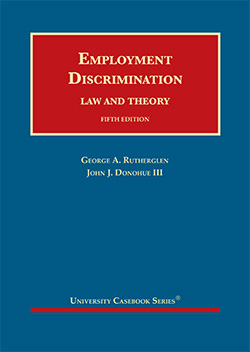- Home
- Employment Discrimination: Law and Theory
Employment Discrimination: Law and Theory
In this edition, the authors preserve the relative simplicity and compact coverage of an introductory employment discrimination law casebook in a field that continues to grow ever more complex. Keeping the larger questions in view, and the controversial arguments that surround them on all sides, remains a challenge as cases and statutes raise ever more finely-tuned issues of doctrine. This edition keeps readers abreast of recent developments, assesses what they hold for the future of employment discrimination law, and introduces the issues in a field of continuing vitality and controversy.
Imprint: Foundation Press
Series: University Casebook Series
Publication Date: 11/15/2021
George A. Rutherglen, University of Virginia School of Law
John J. Donohue III, Stanford Law School
CasebookPlus™
This title is available in our CasebookPlus format. CasebookPlus provides support beyond your classroom lectures and materials by offering additional digital resources to you and your students. Anchored by faculty-authored formative self-assessments keyed to our most popular casebooks, CasebookPlus allows students to test their understanding of core concepts as they are learning them in class – on their own, outside of the classroom, with no extra work on your part. CasebookPlus combines three important elements:
- A new print or digital casebook
- Access to a downloadable eBook with the ability to highlight and add notes
- 12-month access to a digital Learning Library complete with:
- Chapter questions keyed to the casebook
- Black Letter Law questions (available in select subjects)
- Subject area review questions for end of semester use
Leading digital study aids, an outline starter, and audio lectures in select subjects
Students can still utilize CasebookPlus digital resources if they’ve purchased a used book or are renting their text by purchasing the Learning Library at westacademic.com.
With CasebookPlus, you can customize your students’ learning experience and monitor their performance. The quiz editor allows you to create your own custom quiz set, suppress specific quiz questions or quiz sets, and time-release quiz questions. Additionally, the flexible, customized reporting capability helps you evaluate your students’ understanding of the material and can also help your school demonstrate compliance with the new ABA Assessment and Learning Outcomes standards.
Decisions of the Supreme Court continue to alter the landscape of employment discrimination law, on issues as different as the burden of proving retaliation to reasonable accommodation of pregnancy and reasonable accommodation of religious garb. Most dramatically, the Supreme Court has recently interpreted the prohibition against sex discrimination in Title VII to include discrimination on the basis of sexual orientation and gender identity. This interpretation of the statute leads to further issues concerned with the need for statutory exceptions and elaboration, as in legislation currently pending before Congress. In the opposite direction, this development can be traced back to changes in constitutional law which protect the right to gay marriage. From the beginning, constitutional law has exercised a pervasive influence over interpretation of the statutes against employment discrimination. The constitutional standards for affirmative action, addressed in the context of higher education, signal further restrictions on affirmative action in employment. So, too, the burst of public allegations of sexual misconduct by public figures and corporate executives raise the question whether the prohibition against sexual harassment has been adequately enforced.
These developments call for reassessment of the contents of a basic course on employment discrimination. Decisions that took a salient place in earlier editions of this casebook now appear in a different light and, in a number of instances, require that excerpts from them be condensed and that more space given to recent decisions and their implications.
While taking account of these complexities, we have tried to preserve the relative simplicity and compact coverage of an introductory casebook to an area of law that continues to grow more detailed and nuanced. Keeping the larger questions in view, and the controversial arguments that surround them on all sides, remains our goal. A complete account of the law cannot be static, just what it is today, without considering what it might be tomorrow. This new edition takes account of changes in the law, both obvious and subtle, tries to relate them to basic principles of fairness regardless of group membership, the need to allow employers to maintain efficient practices in the workplace, and the demands on the courts to articulate sound rules of interpretation and enforcement.
Learn more about this series.
Access Denied
Law School Faculty - Sign in or Create an Account to access this content. Law faculty who have created an account can sign in after receiving email notification that registration has been approved. Email accountmanager@westacademic.com or call 800-313-9378 for assistance.
Other Higher Education Faculty who wish to access digital review copies or teaching resources should contact their West Academic Account Manager at college@westacademic.com or 800-360-9378.
Adopters Only
This content is intended for adopters only. Sign in or Create an Account to access this content. Law faculty who have created an account can sign in after receiving email notification that registration has been approved. If you are an adopter who is unable to access this content after signing in, contact your account manager for assistance at accountmanager@westacademic.com or call 800-313-9378 for assistance.
Access Denied
Sign in or Create an Account to access this content. Faculty who have created an account can sign in after receiving email notification that registration has been approved. Contact us for assistance.
Law School Faculty: email accountmanager@westacademic.com or call 800-313-9378.
Other Higher Education Faculty: email college@westacademic.com or 800-360-9378.
Access Denied
Higher education faculty who wish to view this document should contact their West Academic Account Manager at college@westacademic.com or 800-360-9378.
